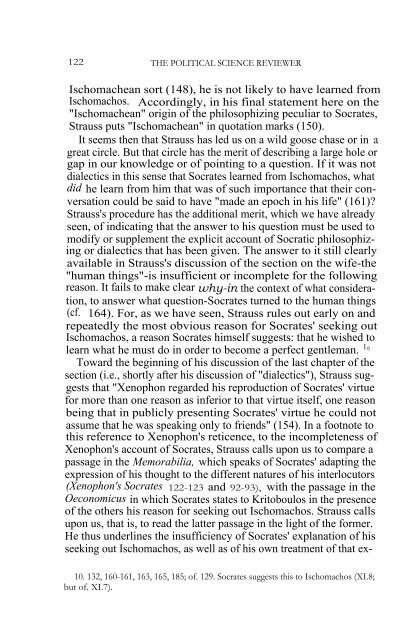Strauss on Xenophon's Socrates Xenophon's Socratic Discourse: An ...
Strauss on Xenophon's Socrates Xenophon's Socratic Discourse: An ...
Strauss on Xenophon's Socrates Xenophon's Socratic Discourse: An ...
You also want an ePaper? Increase the reach of your titles
YUMPU automatically turns print PDFs into web optimized ePapers that Google loves.
122 THE POLITICAL SCIENCE REVIEWER<br />
Ischomachean sort (148), he is not likely to have learned from<br />
Ischomachos. Accordingly, in his final statement here <strong>on</strong> the<br />
"Ischomachean" origin of the philosophizing peculiar to <strong>Socrates</strong>,<br />
<str<strong>on</strong>g>Strauss</str<strong>on</strong>g> puts "Ischomachean" in quotati<strong>on</strong> marks (150).<br />
It seems then that <str<strong>on</strong>g>Strauss</str<strong>on</strong>g> has led us <strong>on</strong> a wild goose chase or in a<br />
great circle. But that circle has the merit of describing a large hole or<br />
gap in our knowledge or of pointing to a questi<strong>on</strong>. If it was not<br />
dialectics in this sense that <strong>Socrates</strong> learned from Ischomachos, what<br />
did he learn from him that was of such importance that their c<strong>on</strong>versati<strong>on</strong><br />
could be said to have "made an epoch in his life" (161)?<br />
<str<strong>on</strong>g>Strauss</str<strong>on</strong>g>'s procedure has the additi<strong>on</strong>al merit, which we have already<br />
seen, of indicating that the answer to his questi<strong>on</strong> must be used to<br />
modify or supplement the explicit account of <strong>Socratic</strong> philosophizing<br />
or dialectics that has been given. The answer to it still clearly<br />
available in <str<strong>on</strong>g>Strauss</str<strong>on</strong>g>'s discussi<strong>on</strong> of the secti<strong>on</strong> <strong>on</strong> the wife-the<br />
"human things"-is insufficient or incomplete for the following<br />
reas<strong>on</strong>. It fails to make clear why-in the c<strong>on</strong>text of what c<strong>on</strong>siderati<strong>on</strong>,<br />
to answer what questi<strong>on</strong>-<strong>Socrates</strong> turned to the human things<br />
(cf. 164). For, as we have seen, <str<strong>on</strong>g>Strauss</str<strong>on</strong>g> rules out early <strong>on</strong> and<br />
repeatedly the most obvious reas<strong>on</strong> for <strong>Socrates</strong>' seeking out<br />
Ischomachos, a reas<strong>on</strong> <strong>Socrates</strong> himself suggests: that he wished to<br />
learn what he must do in order to become a perfect gentleman. l °<br />
Toward the beginning of his discussi<strong>on</strong> of the last chapter of the<br />
secti<strong>on</strong> (i.e., shortly after his discussi<strong>on</strong> of "dialectics"), <str<strong>on</strong>g>Strauss</str<strong>on</strong>g> suggests<br />
that "Xenoph<strong>on</strong> regarded his reproducti<strong>on</strong> of <strong>Socrates</strong>' virtue<br />
for more than <strong>on</strong>e reas<strong>on</strong> as inferior to that virtue itself, <strong>on</strong>e reas<strong>on</strong><br />
being that in publicly presenting <strong>Socrates</strong>' virtue he could not<br />
assume that he was speaking <strong>on</strong>ly to friends" (154). In a footnote to<br />
this reference to Xenoph<strong>on</strong>'s reticence, to the incompleteness of<br />
Xenoph<strong>on</strong>'s account of <strong>Socrates</strong>, <str<strong>on</strong>g>Strauss</str<strong>on</strong>g> calls up<strong>on</strong> us to compare a<br />
passage in the Memorabilia, which speaks of <strong>Socrates</strong>' adapting the<br />
expressi<strong>on</strong> of his thought to the different natures of his interlocutors<br />
(Xenoph<strong>on</strong>'s <strong>Socrates</strong> 122-123 and 92-93), with the passage in the<br />
Oec<strong>on</strong>omicus in which <strong>Socrates</strong> states to Kritoboulos in the presence<br />
of the others his reas<strong>on</strong> for seeking out Ischomachos. <str<strong>on</strong>g>Strauss</str<strong>on</strong>g> calls<br />
up<strong>on</strong> us, that is, to read the latter passage in the light of the former.<br />
He thus underlines the insufficiency of <strong>Socrates</strong>' explanati<strong>on</strong> of his<br />
seeking out Ischomachos, as well as of his own treatment of that ex-<br />
10. 132, 160-161, 163, 165, 185; of. 129. <strong>Socrates</strong> suggests this to Ischomachos (XI.8;<br />
but of. XI.7).

















